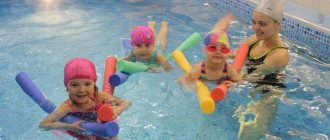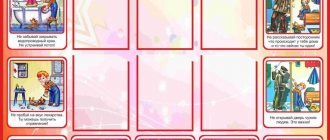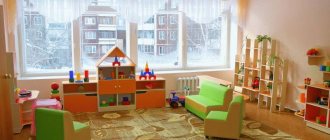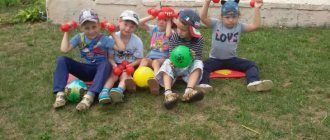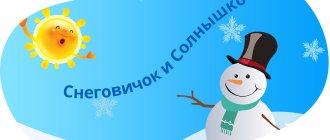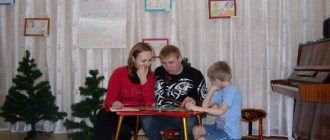The current stage of development of preschool education is characterized by a rapid pace of introduction of innovative technologies into the practice of kindergartens. Federal state educational standards suggest that the construction of the educational process in kindergarten should be based on a comprehensive thematic principle. Therefore, a theme week in kindergarten becomes the basis for planning and organizing work in a preschool institution.
A thematic week, in which the entire educational process is built around a theme, has great potential for the development of preschoolers.
A thematic week in kindergarten allows children to have many opportunities for practical activities, basic experimentation, the formation of basic skills, and the development of mental functions. It unites all types of children's activities in kindergarten, makes them interesting and varied, and most importantly, useful for children. In addition, the thematic week allows the use of a regional and cultural component in the educational process.
Our kindergarten carries out its activities using the approximate basic general educational program of preschool education “From birth to school” N.E. Veraxes. According to the recommendations of the program, when planning the educational process, we pay attention to one topic for at least one week. Similar thematic weeks are introduced in different age groups. This serves to systematize and deepen knowledge, as well as continuity in the development of children throughout preschool childhood.
Taking into account the individual and age characteristics of children, to solve educational problems we determine a range of generally significant topics, as well as topics of interest to children. Thematic weeks are included in the group’s long-term educational work plan for the academic year , which is agreed upon with the senior kindergarten teacher.
The planning of thematic week titles is influenced by:
- educational objectives,
- time period of the year
- children's age.
For example, this is what long-term planning of thematic weeks in the first junior group looks like.
Thematic plan for the teacher of the 1st junior group for 2013-2014.
In the long-term plan, we indicate the month, calendar week and school week number (for convenience when planning).
For example, the third thematic week is called “What autumn brought us (vegetables)!” The organization of direct educational activities in the OO “Cognition”, “Communication and reading fiction”, “Artistic creativity” is based on integration and will be subordinated to this main topic. So, for this thematic week we planned the following direct educational activities:
- “Our garden” (Cognition);
- “Let's treat the Cockerel with peas” (Drawing);
- “Cucumbers” (Modeling);
- “Carrot from the Bunny” and “Root Tops”, using reading works of fiction on the topic.
Once a week, on the day of direct educational activities for the NGO “Cognition,” we plan to conduct a thematic walk, which is a natural continuation of this topic. For example,
"Organization of thematic weeks in preschool educational institutions"methodological development on the topic
Topic “Thematic days in preschool educational institutions”
How to choose a topic?
To choose a theme for the day, refer to the calendar of significant events and memorials. In preschool age, children learn to distinguish between holidays and weekdays, learn that there are international and public holidays, that each of them has its own history. The child should feel the emotional component of the holiday - the state when he participates in the preparation for the event: decorates the group, makes gifts and souvenirs. Children experience special emotions when they congratulate on the holiday and receive congratulations.
For example, in the summer, thematic days can be dedicated to International Children's Day, World Milk Day, World Parents' Day, World Children's Football Day, World Chocolate Day, International Friendship Day, International Chess Day.
The content of a theme day can be the same for all age groups or only for children of a specific age. For example, on June 1, hold a themed Milk Day in younger age groups, and Children’s Day in older preschool age groups.
If the educational process in kindergarten represents a complex thematic model and educational tasks are implemented not only in the classroom, but also in other routine moments, use staging technology. This is a new direction in pedagogical practice. Educators should move away from the traditional writing of a lesson plan and create a script for the entire day or its components (morning reception, thematic walk, etc.).
To create a theme day script, the teacher needs:
objectively assess the level of your work, the environment and conditions in which educational activities are carried out at the time of planning (what the children have already mastered, what results have been obtained);
highlight the goals and objectives, correlate them with the educational program, age composition of the group, priority areas of the educational process in preschool educational institutions;
outline the results of the work that must be achieved (what children will learn new things, what they will learn, what personality traits they will develop);
choose the optimal forms, means, methods to obtain the planned result.
The plan-scenario of the thematic day should ensure the unity of educational, developmental and educational goals and objectives and the integration of educational areas.
How to host a theme day
During theme days, educators must be creative, take into account the level of knowledge and skills of the children in their group, come up with surprise moments, elements of including preschoolers in games and activities. The topic of the day should be revealed in an emotionally figurative form. It is important not only to convey new knowledge, but also to organize the “living” of the topic in different types of children's activities:
games;
cognitive and research activities;
experimentation;
visual activities;
through the perception of fiction, music.
When organizing different types of children's activities, united by one theme, the role of the teacher becomes free, partner-like: we play together, experiment, look for answers to questions, and engage in creativity. The teacher’s involvement in activities along with the children makes the process emotionally rich and effective.
The game occupies a special place in the theme day. The teacher must create conditions to interest children in various types of games and develop their gaming skills. Play during a theme day is a free independent activity for preschoolers. At the same time, you need to think about how to implement most of its content.
The teacher’s position “Let’s come up with something else...” will allow us to fill the educational process with the interests of children. They will become not performers, but active participants in the game simulation.
Scenario plan for Health Day for children of primary and secondary preschool age (Magazine Senior Educator - April 2017)
Scenario plan for Friends Day for children of senior preschool age
(Appendix 2. Senior teacher magazine – April 2017)
Thematic weeks in elementary school according to the Federal State Educational Standard
Thematic weeks as a means of organizing educational space in primary school
Explanatory note
I consider the main goal of educational work in the classroom to be the creation of a friendly team, the creative development of each child, the creation of such an atmosphere in the classroom so that the child enjoys going to school and receives positive emotions. Receiving a positive charge, the body opens to goodness and beauty. It is believed that a child immersed in an atmosphere of joy from an early age will grow up to be more resistant to many unexpected situations and will be less susceptible to stress and disappointment. This is why children need holidays and entertainment. Preschoolers go to school with great joy. For them, going to school is an extraordinary holiday. They expect meetings with interesting people, fun holidays, and some wonderful events from school. And we, teachers, should not disappoint them in this. The brightest, most unforgettable holiday is the one in which the whole family takes part. Such a holiday unites parents and children, gives love and the joy of communicating with the most dear people. When preparing for such a holiday, everyone will find something to their liking. The child’s eyes glow with joy, he is proud that his parents are taking part in the holiday next to him. In my practice, I use the organization of such family holidays. The following holidays were held: “Dad, Mom, I am a sports family”, “Dad, Mom, I am a creative family”, “Dad, Mom, I am a musical family”, “Dad, Mom, I am a Sochi family”, “ Dad, Mom, I’m a reading family,” “Dad, Mom, I’m a fishing family.” These holidays are the culmination of the themed weeks.
Why did I choose thematic weeks as the basis for educational work in the classroom?
Holding themed weeks seems to me to be a very successful form of organizing the educational process in primary schools. It is based on a method of collective creative work, in which each student can determine his place and realize his abilities and capabilities. Thematic weeks help to build educational work more purposefully and reasonably. It has already become a tradition to hold subject weeks in schools in mathematics, Russian language and literature, the environment around the world, and Kuban studies. Apart from academic subject weeks, other weeks are not practiced. In general, educational work is built on certain events that are not related to each other, so I consider one of the advantages of a thematic week to be the use of a wide range of events dedicated to a single topic. Every student and his parents take part in the preparation of thematic weeks. It is the task of the teacher and parents to skillfully think through, carefully organize, and fill the thematic week with the necessary content.
Thematic weeks
The goals of the thematic week: activation of students' cognitive activity, expansion of knowledge, creation of conditions for self-expression, self-affirmation, self-realization of each student, targeting children for effective work.
A few days in advance, an announcement about the upcoming theme week is posted in the classroom corner, and a plan for its implementation is indicated. Each student can choose an event in which he will take part, prepare for it, go to the library and find the necessary material in books, encyclopedias, reference books, and use Internet materials. Someone will want to participate in one event, someone in two, and someone will not miss a single event. In addition, you can prepare for events individually, or in groups. Working together brings the team together, children get to know each other better, they rejoice at the successes of their comrades, are upset by failures, and try to come to each other’s aid in time.. The child tries his hand at various areas of activity. In preparation for the thematic week, the teacher thinks through various forms, methods, means of conducting it, the use of technical means: computer, interactive whiteboard, TV, etc. Olympiads, quizzes, KVNs, tournaments, competitions, excursions, exhibitions, newspaper releases, holidays, etc. are widely used. The following thematic weeks were very interesting: Black Sea Week, Politeness Week, Favorite Game and Toy Week, Sports Week, Music Week, Creativity Week, Flower Week, Intellectual Week, Pochemuchkina Week, Career Guidance Week. On the last day of the thematic week, the results are summed up. Children tell what they learned about, what they learned, where they visited. The teacher and parents prepare surprises for each child. Assessing the effectiveness of thematic weeks, we note the following: - the level of moral education of children has increased (attitude towards their classmates, the surrounding nature, animals) - students have gained confidence in their strengths and capabilities, they began to participate more actively in various events - the horizons of younger schoolchildren have expanded according to educational material. Most parents are satisfied with the results of their children’s education and upbringing, and their position in the classroom. I propose plans for thematic weeks. 1st grade
September “Let’s get to know each other.” Goal: getting to know the school, classmates, parents. Monday Class hour "Let's get to know each other." Archival excavations "What does my name mean?" Tuesday Getting to know the school (excursion) Wednesday Exhibition of creative works “My Hobbies” Thursday Drawing competition “Me and my family” Friday Celebration “We have become schoolchildren.” Summing up the week. October “Guys! Let's live in peace!" Goal: uniting the children's team Monday Testing “Am I a good friend?” Tuesday Outdoor Games “Let’s join hands, friends!” Wednesday Competition of humorous questions “Living without a smile is just a mistake.” Thursday Conversation “If you don’t have a friend, look for him, but if you find him, take care of him.” Friday Holiday “Autumn Birthday Day”. Summing up the week. November “Road Traffic Week” Goal: to attract students to study traffic rules, to prevent children’s road traffic injuries. Monday Meeting with a traffic police inspector Tuesday City tour “The street where I live” Wednesday Drawing competition “Everyone should know the rules of the road.” Role-playing game “We are passengers.” Thursday Quiz “In the land of road signs.” Friday Parents' meeting “Everyone should know this” December “Work week” Goal: instilling diligence, the desire to benefit people through their work. Monday Opening of Father Frost's workshop “Create, invent, try!” Tuesday Competition of New Year's toys and carnival masks. Wednesday Conversation “Celebrating the New Year in different countries” Thursday Making gifts for loved ones “Our hands do not know boredom.” Friday Carnival “Hello, New Year!” Summing up the week. January “In the world of animals” Goal: instilling a love for animals Monday Children’s performances with stories about pets “Animals of our home.” Tuesday Quiz “Our friends are birds.” Wednesday Drawing competition “Our Little Brothers”. Thursday KVN “The Wonderful World of Insects” Friday Viewing slides and videos “Animals from the Red Book”. Animals are record holders. Summing up the week. February “In the world of plants” Goal: to introduce the diverse world of plants, to cultivate a caring attitude towards nature. Monday Exhibition “Our indoor plants” Tuesday Conversation “Bread on the table, well-being in the family.” Environment Medicinal plants. Speech by a school biology teacher. Thursday “Record-breaking plants.” Student messages. Friday Watching videos “Plants from the Red Book”. Summing up the week. March “With love for a woman” Goal: to cultivate love for loved ones Monday Conversation “Spring is the time of awakening” Tuesday Operation “Souvenir”. Workshop for making souvenirs Wednesday Competition among girls “Miss Bow” Thursday Speech by the librarian “One Hundred Great Women” Friday Celebration “My mother is the best in the world.” Summing up the week. April “Health Week” Goal: to accustom students to physical education and a healthy lifestyle. Monday Conversation “Heroic Nursery Rhymes”. History of games of Slavic peoples. Tuesday Walk into the spring forest “Along the palms of spring.” Wednesday Quiz “Sport, sport, sport” Thursday ABC of hardening “Folk remedies for a healthy childhood.” Speech by the school doctor. Friday Sports competition “Dad, Mom, I am a sports family.” Summing up the week. May “Know-It-All Week” Goal: expand the intellectual horizons of students Monday Conversation “Books are our best friends.”
Tuesday Game “The Smartest” Wednesday oral journal “I want to know everything.” Thursday Competition for the best knowledge of literary works Friday Quiz “On the roads of fairy tales.” Summing up the week. 2nd grade
September “Autumn leaf - the beauty of nature” Goal: to cultivate love for the world around us Monday Essay competition “My Vacations” Tuesday Competition of drawings and crafts from natural materials “Gifts of Autumn”. Wednesday Quiz on natural history “Visiting the Old Forest Man.” Thursday Oral journal “Signs of Autumn”. Friday Holiday "Golden Autumn". Summing up the week. October “Game Week” Goal: to develop children’s cognitive activity Monday Exhibition of favorite toys. Children's stories about their favorite toys. Tuesday Learning outdoor games of different nations Wednesday Conversation about the history of the Russian nesting doll Thursday Board game competition Friday Celebration of your favorite toy. Summing up the week. November “Why Chick Week” Goal: to develop the intellectual level of students Monday Watch the video “Is there life in the Universe?” Tuesday Questions and Answers Hour Wednesday Oral Journal “It’s Interesting to Know” Thursday Conversation at the Book Exhibition “Why Did Dinosaurs Go Extinct?” Friday Competition “Know-It-All Riddles”. Summing up the week. December “Bird Week” Goal: to expand students’ knowledge about birds Monday Conversation “Say a word about the owl of prey” Tuesday Quiz “In the world of birds” Wednesday Drawing competition “Birds are our friends” Thursday Making feeders “Our good deeds to the city” Friday Excursion to the park "Listening to the voices of birds." Summing up the week. January “Week of Politeness” Goal: To cultivate respect for adults, a sense of responsibility for one’s actions Monday Conversation “Polite words and their application” Tuesday Kindness in poetry and fairy tales. Dramatization of excerpts from poems and fairy tales Wednesday Operation “Good deeds for my home” Thursday Business game “How to behave in public places” Friday Festival of polite guys “To give joy to people, you need to be kind and polite.” Summing up the week. February “Sports Week” Goal: to instill a love of sports Monday Student messages “Sporting achievements from the Guinness Book of Records” Tuesday Jump rope competition Wednesday “Fun Starts” Thursday Quiz “In the World of Sports” Friday Small Olympic Games. Summing up the week. March “Fairy Tale Week” Goal: to instill a love for fairy tales Monday Quiz “A fairy tale has come to visit us” Tuesday Auction “Who was here and forgot what?” Wednesday Drawing competition “My favorite fairy tales” Thursday Visit to the puppet theater Friday Celebration “At the Magic Window”. Summing up the week. April “Ecological Week” Goal: to teach students to take care of the surrounding nature Monday Oral journal “Ecology and We” Tuesday City March of Parks Wednesday KTD “Paths of Nature”. Making crafts from waste materials Thursday Intellectual game “Starry Hour” Friday Holiday “Take care of the planet”. Summing up the week. May “Russian folk crafts” Goal: to introduce students to Russian folk crafts: Khokhloma, Dymkovo toys, Gorodets painting;
to cultivate interest and love for the art of their people Monday Getting to know Khokhloma Tuesday Painting a Dymkovo toy Wednesday Gorodets painting Thursday Handicrafts Fair Friday Russian Matryoshka Holiday. Summing up the week. 3rd grade
September “Flower Week” Goal: to expand students’ knowledge about flowers Monday Drawing competition “We draw flowers” Tuesday Autumn bouquet competition Wednesday Excursion to nature “In a flower meadow” Thursday Quiz “Flower Why” Friday Holiday “Wonderful World of Flowers”. Summing up the week. October “Pushkin Week” Goal: to expand children’s knowledge about the poet, to cultivate a love for his work Monday Conversation about Pushkin. Exhibition of works by Pushkin Tuesday Drawing competition based on the works of Pushkin Wednesday Reading competition “Consonance of living words” Thursday Quiz based on the works of A.S. Pushkin Friday Holiday “At the Lukomorye”. Summing up the week. November “Week of National Cultures” Goal: to cultivate respect for people of different nationalities Monday Conversation “What nationalities people live in our region” Tuesday Customs of the peoples of the Caucasus Wednesday National costumes. Exhibition. Thursday Competition of national dishes Friday Festival of national cultures. Summing up December “Black Sea Week” Goal: to expand students’ knowledge about the flora and fauna of the Black Sea Monday Action “Clean Coast” Tuesday Drawing competition “My Black Sea” Wednesday Quiz “Sea Experts” Thursday Intellectual and creative game “Jung” Friday Visit to the aquarium . Summing up January “Career Guidance Week” Goal: to cultivate a respectful attitude towards people of different professions Monday Release of the newspaper “All works are good, choose to taste” Tuesday KTD “Who to be” Wednesday Meeting with parents. Parents' stories about their professions Thursday Class hour “All professions are needed, all professions are important” Friday Excursion to the station. Getting to know the professions of the people working there. Summing up the week. February “Maslenitsa Week” Goal: to introduce the traditions of the Russian people Monday Conversation about Maslenitsa Tuesday Competition for the best pancake recipe Wednesday Tea party with pancakes Thursday Outdoor games Friday Maslenitsa holiday. Summing up the week March “Book Week” Goal: expand and activate students’ vocabulary, cultivate a love for books Monday Conversation “Where the book came from. Knizhkin’s birthday.” Tuesday Visit to the city library Wednesday Reading competition Thursday Essay competition about books read Friday Celebration “Dad, Mom, I – a reading family.” Summing up the results of the week April “Cosmonautics Week” Goal: to expand knowledge about space and cosmonauts Monday Oral magazine “Pilots - Cosmonauts” Tuesday Drawing competition “The Universe through the eyes of children” Wednesday Game “Field of Miracles” Thursday Space KVN Friday Visit to the observatory. Summing up the week. May “Patriotic Week” Goal: to cultivate love for the Motherland, to form an active life position, to cultivate a sense of patriotism Monday Conversation about Victory Day Tuesday Messages from students “Pioneers are heroes” Wednesday Meeting with a veteran of the Great Patriotic War Thursday Laying flowers at the monument to fallen soldiers Friday Class hour "No one is forgotten, nothing is forgotten".
Summing up the week. 4th grade
September “Music Week” Goal: to instill a love of music Monday Conversation “Great Composers” Tuesday Music quiz “Let’s fill our hearts with music” Wednesday Karaoke song competition “Once - a word, two - a word - there will be a song” Thursday Musical transformations (use in everyday life of various objects in the role of musical instruments) Friday Holiday “Dad, Mom, I – a musical family.” Summing up the week. October “Local History Week” Goal: to expand children’s knowledge about their region Monday Conversation “Symbols of our region” Tuesday Watching the film “Sochi - the capital of the Winter Olympic Games” Wednesday Pages of history “Our Great Compatriots” Thursday Auction of folk wisdom (for knowledge of Kuban proverbs and sayings ) Friday Holiday “Dad, Mom, I - Sochi Family”. Summing up the week. November “Parents Week” Goal: to strengthen the relationship between the school and parents Monday Meeting with parents of different professions Tuesday Open Day. Open lessons for parents. Wednesday Joint visit to the theater Thursday Musical lounge “Happy family. What is she like? Friday Celebration “Tea for Mom” (for Mother’s Day). Summing up the week. December “Correspondence Travel Week” Goal: to expand the geographical knowledge of schoolchildren Monday Traveling around Russia Tuesday Traveling the world Wednesday Watching videos “7 Wonders of the World” Thursday Quiz “Do you know the countries of the world” Friday Competition for the best traveler. Summing up the week. January “Chef’s Week” Goal: to cultivate kindness and mercy Monday Conversation “Caring for others” Tuesday Role-playing game “Come to visit” Wednesday Operation “Joy to the kids” Thursday Scouting for good deeds “Who needs my help?” Friday Operation Red Cross. (Providing assistance to the elderly and sick people). Summing up the week. February “Week “The Art of Communication” Goal: to teach children to avoid conflict situations Monday Conversation “Psychology of Communication” Tuesday Competition for the most patient (creating a situation) Wednesday Analysis of a conflict situation. Thursday Scenes from school life Friday Training on stress resistance. Meeting with a psychologist. Summing up the week. March “Great people of Russia” Goal: to introduce outstanding people of Russia Monday Great artists. Watch videos Tuesday Famous writers and poets. Literary quiz Wednesday Great composers. Listening to musical works Thursday Student messages “Heroes of Russia” Friday Live newspaper “Russia is one of the great powers.” Summing up the week. April “Humor Week” Goal: to develop a sense of humor Monday History of the day of humor and laughter Tuesday Competition for the best storyteller Wednesday Artistic whistling day Thursday Sweet fair Friday Humorous relay race. Summing up the week. May “Intellectual Week” Goal: to develop the intelligence of primary schoolchildren Monday Game “Starry Hour” Tuesday KVN “The World Around Us” Wednesday Dispute “Is it easy to be smart?” Thursday Brain - ring “Everything in the world is interesting” Friday Olympics in academic subjects “The smartest”. Summing up the week. We want to see our students smart, kind, well-mannered, cultured, able to love and understand their family, friends, and teachers. We need to help the child become what we want him to be. And thematic weeks can help with this. And then the school can become for children the home that is mentioned in E. Kulinko’s poem.
A house, as everyone has known for a long time, is not walls, not a window, these are not chairs at the table, this is not a house.
Home is where they understand you, Where they hope and wait, Where you forget about the bad, this is your home. Literature: 1. Magazine “Primary School” 2. Newspaper “First of September” 3. Newspaper “Pedagogical Council”
We recommend watching:
Extracurricular activities program - 2nd grade Development of cognitive interest of primary school students through solving artistic problems Development of artistic abilities of younger schoolchildren in literary reading lessons Working with text, 4th grade. Rhetoric course
Similar articles:
State standard requirements for literary reading and the Russian language in primary school
Creating an educational environment in primary classes
Features of educational work in elementary school
Monitoring class cohesion
Education in primary school according to the Federal State Educational Standard
Why do educators need themed weeks?
Gulidova Inna Sergeevna
Improving the education system requires introducing into the practice of educational institutions a set of measures aimed at timely providing each child with the necessary conditions for comprehensive development; formation of a full-fledged personality, receiving proper education.
If the content of educational activities is not related to the life of children in kindergarten, then they quickly forget about it. The solution to this problem is simple. Invite educators to hold a themed day: dedicate all routine moments to one topic.
What is a theme day? This is when an educator chooses a specific topic to solve educational problems and combines it with a holiday or calendar event. Thus, this topic is at the center of the pedagogical process.
The thematic plan outlines the main goals, and its content is divided into five days of the week.
In the outline plan, the teacher will find a list of approximate forms of organizing work with children, proposals for equipping the developmental environment in the group and forms of interaction with the parents of the students. Each topic has a climax, which the teacher has the right to adjust if necessary.
Materials for working with children are a list of literature for children to read, conversations, riddles, sayings, games, visual aids, etc.
Methodological tips and encyclopedic and reference material will provide brief information that, if necessary, will help make adjustments to the educational process and show creativity.
With the help of themed days, the teacher will be able to plan interesting and meaningful work with preschoolers and solve various educational, educational, and developmental tasks. When a child participates in a theme day, he or she develops cognitive motivation and engagement, and begins to follow cultural norms—including rules for interacting with other people.
Correct selection of thematic information by the teacher contributes to its better assimilation by preschoolers, the emergence of numerous opportunities for the development of their conceptual thinking, basic skills, experimentation and play.
During theme days, educators must be creative, take into account the level of knowledge and skills of the children in their group, come up with surprise moments, elements of including preschoolers in games and activities.
When organizing different types of children's activities, united by one theme, the role of the teacher becomes free, partner-like: we play together, look for answers to questions, and engage in creativity. The teacher’s involvement in activities along with the children makes the process emotionally rich and effective.
These activities pursue several objectives simultaneously.
Firstly, a cognitive task is solved: depending on the topic of the week, activities include new material, in accordance with the educational program and taking into account all age groups of the preschool educational institution, which is considered in a slightly different aspect than in the classroom, which contributes to the best learning of the material .
Secondly, the social aspect of the pedagogical process is revealed, this is: the interaction of children of different ages, the involvement of parents not only as spectators, but, above all, as direct participants. And, of course, with the help of adults and children, the problem of artistic and aesthetic direction, which is the priority of the preschool educational institution, is solved.
The game occupies a special place in the theme day. The teacher must create conditions to interest children in various types of games and develop their gaming skills. Playing during a theme day is a free independent activity for preschoolers. At the same time, you need to think about how to implement most of its content.
It is important to properly equip the subject-development environment in groups in accordance with the theme of the day. According to the Federal State Educational Standard for Educational Education, a developing subject-spatial environment must ensure maximum realization of the educational potential of the group space and be content-rich, transformable, multifunctional, variable, accessible and safe. The manual is addressed to teachers of preschool educational organizations.
